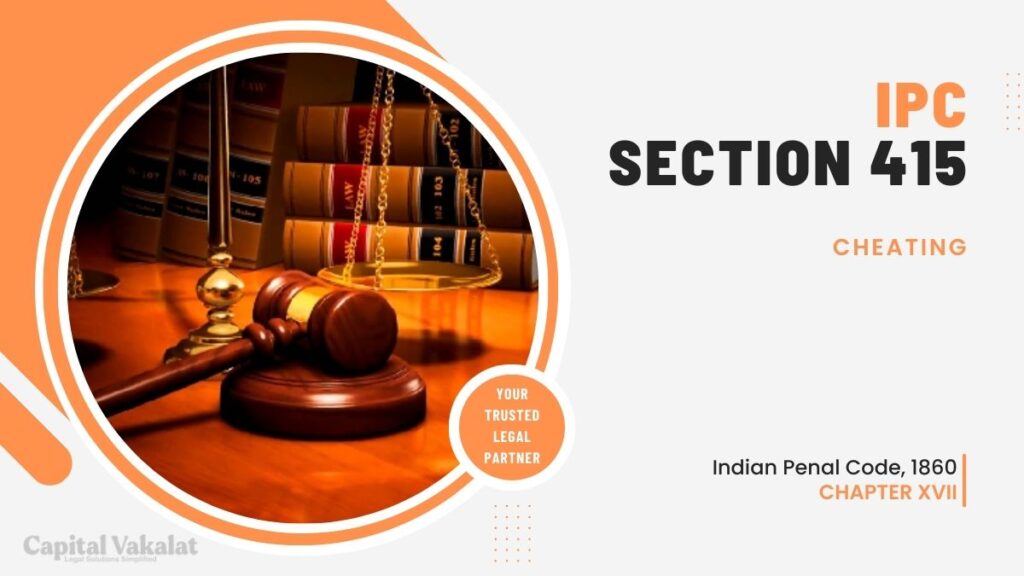Cheating, as defined under Section 415 of the Indian Penal Code (IPC), encompasses a wide range of deceptive practices that can have profound legal consequences.

This article delves into the intricacies of Section 415 IPC, examining its elements, punishments, and the broader implications on businesses and individuals.
Introduction to Section 415 IPC
Definition and Overview
Section 415 IPC primarily deals with the offense of cheating, providing a legal framework to address cases where individuals employ deceitful means to gain an unfair advantage. Understanding the nuances of this section is crucial for comprehending the legal consequences associated with deceptive practices.
Importance in Legal Framework
The inclusion of Section 415 in the IPC underscores its significance in maintaining the integrity of commercial transactions and interpersonal dealings. It serves as a deterrent against fraudulent activities and ensures a level playing field in various spheres of life.
Elements of Cheating under Section 415
Deception and Dishonesty
One of the fundamental elements of cheating under Section 415 is the presence of deception and dishonesty. Analyzing how these elements manifest in real-world scenarios provides insights into the diverse ways individuals may engage in fraudulent practices.
Inducing Belief of a False Fact
Section 415 requires the accused to induce a belief in the victim’s mind regarding a false fact. Unraveling the psychological aspects of how such beliefs are cultivated sheds light on the complexity of cheating cases.
Punishments and Consequences
Imprisonment and Fine
The severity of punishments under Section 415 varies, involving both imprisonment and fines. Exploring the rationale behind these punitive measures provides a deeper understanding of the legal consequences that wrongdoers may face.
Severity Based on Aggravating Factors
Examining the factors that may aggravate the punishment under Section 415 helps in gauging the gravity of different cheating scenarios. This section explores the nuances that influence the severity of legal consequences.
Distinction from Other Offenses
Distinguishing Cheating from Fraud
While cheating and fraud may seem synonymous, they entail distinct legal implications. Drawing clear lines between these offenses is crucial for a precise interpretation of Section 415 IPC.
Comparative Analysis with Related Sections
Section 415 exists within a legal landscape that includes other relevant sections. A comparative analysis provides clarity on the boundaries and unique characteristics of each, avoiding confusion in legal interpretation.
Notable Cases and Precedents
Landmark Judgments Interpreting Section 415
Examining landmark judgments helps in understanding the evolving interpretations of Section 415 by the judiciary. Insights from these cases contribute to the jurisprudential development of cheating laws.
Evolving Jurisprudence
As legal precedents evolve, so does the jurisprudence surrounding Section 415. Analyzing recent trends in judgments provides a forward-looking perspective on the legal dynamics of cheating cases.
Defenses Against Allegations of Cheating
Lack of Intent
A crucial defense in cheating cases involves proving the lack of intent to deceive. Understanding how intent is established or disproven in legal proceedings is pivotal for individuals facing allegations under Section 415.
Consent and Good Faith
Exploring defenses based on consent and good faith sheds light on scenarios where actions might be perceived as cheating but are, in fact, legitimate. These defenses play a crucial role in shaping legal outcomes.
Challenges in Prosecuting Cheating Cases
Burden of Proof
Prosecuting cheating cases presents challenges related to the burden of proof. Examining how this burden is established and met in courtrooms provides insights into the dynamics of legal proceedings.
Gathering Evidence
The admissibility and weight of evidence are critical in cheating cases. Delving into the challenges associated with gathering and presenting evidence helps understand the complexities of proving deceptive practices.
Recent Amendments and Changes
Legislative Updates Affecting Section 415
The legal landscape is not static, and amendments may impact the application of Section 415. Exploring recent legislative changes and their implications offers a contemporary perspective on cheating laws.
Implications on Legal Proceedings
Understanding how legislative changes influence legal proceedings provides practitioners and individuals with the necessary insights to navigate the evolving landscape of cheating allegations.
Impact on Businesses and Individuals
Addressing Cheating in Commercial Transactions
Businesses often find themselves vulnerable to cheating in commercial transactions. Analyzing strategies to address and prevent cheating is crucial for safeguarding the interests of enterprises.
Safeguarding Personal and Financial Interests
Individuals, too, face the risk of being cheated in various aspects of life. Exploring practical measures to safeguard personal and financial interests empowers individuals to protect themselves from deceptive practices.
Conclusion
In conclusion, Section 415 IPC plays a pivotal role in shaping the legal response to cheating cases. This article has navigated through the elements, punishments, defenses, and challenges associated with Section 415, providing a comprehensive understanding of its dynamics.
Frequently Asked Questions
How does Section 415 IPC differ from Section 420 (Fraud) of the IPC?
Section 415 focuses on cheating by deceitful means, while Section 420 deals with fraudulent activities involving dishonest inducement and pecuniary advantage.
What defenses can be used against allegations of cheating under Section 415?
Defenses may include proving lack of intent, establishing consent, and demonstrating actions in good faith. Each case requires a nuanced approach.
Are there any recent amendments to Section 415 IPC that individuals should be aware of?
Legislative updates can impact the interpretation of Section 415. Staying informed about recent amendments is crucial for legal practitioners and individuals alike.
How can businesses protect themselves from cheating in commercial transactions?
Implementing robust contractual agreements, due diligence, and monitoring mechanisms are essential for businesses to mitigate the risk of cheating in commercial dealings.